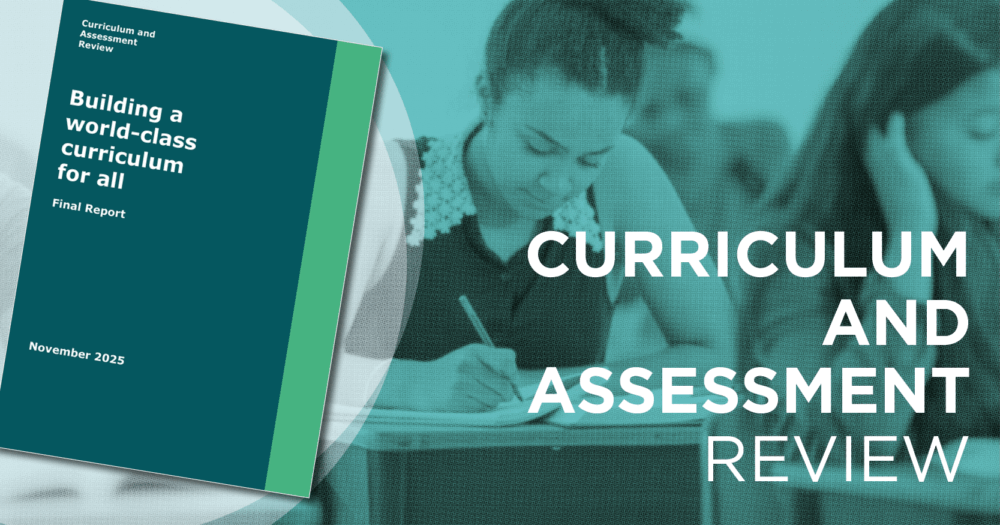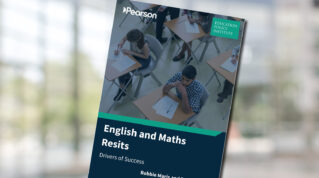College performance measures for English and maths will be changed so the government can monitor how much time students have in learning before they are entered for resit exams.
The Department for Education (DfE) has confirmed it will “revise” the reinstated 16 to 18 English and maths progress measure and qualification achievement rates in its response to the curriculum and assessment review, led by Becky Francis, published today.
Francis’s review concluded, and DfE agreed, that students should continue to be required to study towards grade 4 GCSE passes in English and maths if they don’t reach that level when they leave school.
But she found that “providers reported certain aspects of performance and accountability arrangements may be inadvertently contributing to the practice and culture of repeated resits, including pressure to enter learners for exams prematurely.”
Most of Francis’s proposals for 16 to 19 education, such as V Levels, English and maths GCSE stepping-stone qualifications and two new level 2 pathways, were accepted in the government’s post-16 education and skills white paper, which was published two weeks ago.
The white paper, published last month, also appeared to criticise colleges for entering unprepared learners for resit exams.
“Too many students are entered into resit exams in the November after their GCSE entry the previous summer, without sufficient additional teaching to enable them to succeed,” it said.
The 16 to 18 English and maths progress measure, part of a range of accountability measures for schools and colleges, shows the difference between students’ English and maths results at age 16 with their results at the end of their 16-18 study. It was paused following the pandemic, but will be brought back this year as planned.
Responding to Francis’s findings, DfE said: “We agree with the review’s recommendation that we should immediately take steps to strengthen the condition of funding and accountability system.
“We have reinstated the 16 to 18 English and maths progress measure this academic year, for 2024 to 2025 data.
“We will revise this measure, and qualification achievement rates, to ensure they reinforce the need for sufficient time to be given to students to consolidate learning prior to entry.”
Officials will “begin full engagement with the sector on these changes and the timeline for their implementation.”
DfE added it will continue to monitor the impact of this year’s condition of funding requirements to deliver a minimum of 100 hours of face-to-face teaching for each of English and maths for eligible students, increases in numbers of students in scope of the policy, and clearer guidance on which students would typically be suitable for entry into the November exam series.
The response also agreed with the review’s recommendation to explore how to better incentivise “effective practice” across the sector.
It confirmed the government is enlisting the Education Endowment Foundation, which is run by Francis, to examine what works to ensure strong outcomes for 16-19 year olds.
Enriched at college
DfE also confirmed it will work with college leaders to extend planned guidance on a “high-quality” enrichment offer in schools to colleges.
The enrichment framework, which the government previously committed to publishing by the end of the year, will now be extended to further education settings, and along the same timeline.
Francis criticised the current “non-qualification” offer for 16-19 year olds as being “inconsistent” and current guidance from DfE as “ambiguous” and “unhelpful.”
In its response, DfE said it was: “already developing guidance for schools to deliver a high-quality enrichment framework.
“Working with college leaders, we will extend this framework to further education settings. This will improve the consistency of students’ enrichment experience across the country by promoting highly effective practice.”
DfE said “beyond enrichment” it also wants to improve the transfer of information between schools, colleges and higher education providers.
This follows the government’s commitment, as stated in the post-16 white paper, to tackle rising NEET numbers underpinned by “better data” to track attendance and destinations.
David Hughes, chief executive of the Association of Colleges, said: “I am pleased to see the recognition of the value of enrichment and extra-curricular activity. Every young person deserves access to sport, arts, civic engagement, social action and life skills and we want to see that entitlement properly funded and embedded in 16-19 study programmes.
“Colleges already do a great deal in this space, often with limited resources, and this commitment must be matched by investment.”
Refining T Levels
The government promised to continue to “refine” content, assessment and industry placement requirements for T Levels after the review recommended the “assessment burden” of the qualifications should be reduced.
“We have been refining the approach on content, assessment and industry placements to make T Levels more accessible and manageable at scale while retaining their quality and rigour,” DfE said. “As recommended by the review this work will continue.”
In March, DfE streamlined the core content and reduced assessment volume in the digital, construction and education and early years T Levels.
The DfE response added the government will work with Skills England, employers, Ofqual, awarding organisations, schools, colleges, and universities to increase T Level student numbers.
It also agreed with Francis’ review that there is a “strong rationale” for V Levels to create a mixed programme of study, but stressed that where large qualifications are required, “these should be T Levels”.
“We agree with the review that there may be a need for large qualifications in areas where there are not T Levels at present, and we launched a new marketing T Level in September,” DfE said.
















Your thoughts